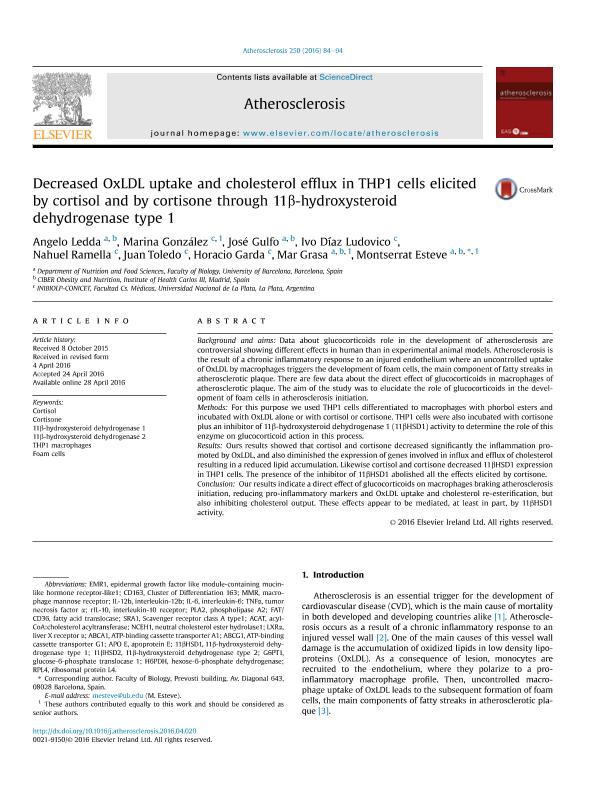Artículo
Decreased OxLDL uptake and cholesterol efflux in THP1 cells elicited by cortisol and by cortisone through 11β-hydroxysteroid dehydrogenase type 1
Ledda, Angelo; Gonzalez, Marina Cecilia ; Gulfo, José; Díaz Ludovico, Ivo
; Gulfo, José; Díaz Ludovico, Ivo ; Ramella, Nahuel
; Ramella, Nahuel ; Toledo, Juan Domingo; Garda, Horacio Alberto
; Toledo, Juan Domingo; Garda, Horacio Alberto ; Grasa, María del Mar(senior author); Esteve, Montserrat
; Grasa, María del Mar(senior author); Esteve, Montserrat
 ; Gulfo, José; Díaz Ludovico, Ivo
; Gulfo, José; Díaz Ludovico, Ivo ; Ramella, Nahuel
; Ramella, Nahuel ; Toledo, Juan Domingo; Garda, Horacio Alberto
; Toledo, Juan Domingo; Garda, Horacio Alberto ; Grasa, María del Mar(senior author); Esteve, Montserrat
; Grasa, María del Mar(senior author); Esteve, Montserrat
Fecha de publicación:
07/2016
Editorial:
Elsevier Ireland
Revista:
Atherosclerosis
ISSN:
0021-9150
Idioma:
Inglés
Tipo de recurso:
Artículo publicado
Clasificación temática:
Resumen
Background and aims: Data about glucocorticoids role in the development of atherosclerosis are controversial showing different effects in human than in experimental animal models. Atherosclerosis is the result of a chronic inflammatory response to an injured endothelium where an uncontrolled uptake of OxLDL by macrophages triggers the development of foam cells, the main component of fatty streaks in atherosclerotic plaque. There are few data about the direct effect of glucocorticoids in macrophages of atherosclerotic plaque. The aim of the study was to elucidate the role of glucocorticoids in the development of foam cells in atherosclerosis initiation. Methods: For this purpose we used THP1 cells differentiated to macrophages with phorbol esters and incubated with OxLDL alone or with cortisol or cortisone. THP1 cells were also incubated with cortisone plus an inhibitor of 11β-hydroxysteroid dehydrogenase 1 (11βHSD1) activity to determine the role of this enzyme on glucocorticoid action in this process. Results: Ours results showed that cortisol and cortisone decreased significantly the inflammation promoted by OxLDL, and also diminished the expression of genes involved in influx and efflux of cholesterol resulting in a reduced lipid accumulation. Likewise cortisol and cortisone decreased 11βHSD1 expression in THP1 cells. The presence of the inhibitor of 11βHSD1 abolished all the effects elicited by cortisone. Conclusion: Our results indicate a direct effect of glucocorticoids on macrophages braking atherosclerosis initiation, reducing pro-inflammatory markers and OxLDL uptake and cholesterol re-esterification, but also inhibiting cholesterol output. These effects appear to be mediated, at least in part, by 11βHSD1 activity.
Archivos asociados
Licencia
Identificadores
Colecciones
Articulos(INIBIOLP)
Articulos de INST.DE INVEST.BIOQUIMICAS DE LA PLATA
Articulos de INST.DE INVEST.BIOQUIMICAS DE LA PLATA
Citación
Ledda, Angelo; Gonzalez, Marina Cecilia; Gulfo, José; Díaz Ludovico, Ivo; Ramella, Nahuel; et al.; Decreased OxLDL uptake and cholesterol efflux in THP1 cells elicited by cortisol and by cortisone through 11β-hydroxysteroid dehydrogenase type 1; Elsevier Ireland; Atherosclerosis; 250; 7-2016; 84-94
Compartir
Altmétricas



